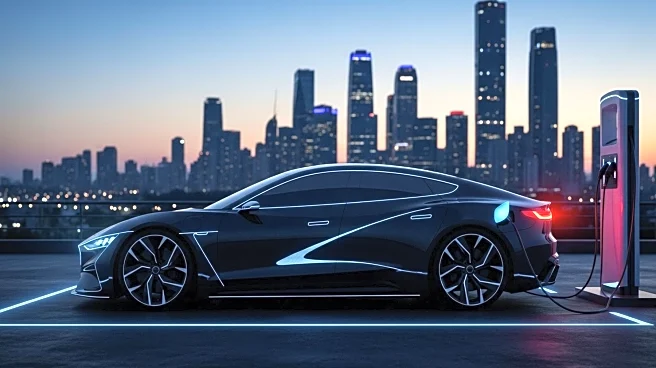What's Happening?
Mercedes-Benz has unveiled the electric version of its popular GLC SUV, marking a significant step in the automaker's transition to electric vehicles. The new GLC with EQ Technology is equipped with a 94.0-kilowatt-hour lithium-ion battery pack, delivering up to 483 horsepower. This power output surpasses that of the BMW iX3, one of its main competitors. The electric GLC also boasts a towing capacity of 5,291 pounds when equipped with an optional trailer hitch. The vehicle features an 800-volt architecture, allowing it to achieve a range of 443 miles on the European WLTP cycle, although this figure is expected to be lower under the EPA testing cycle. The GLC can recharge up to 188 miles of range in just 10 minutes, thanks to its maximum charging capacity of 330 kilowatts. The SUV includes advanced driver assistance systems and a large Hyperscreen, enhancing both safety and user experience.
Why It's Important?
The introduction of the electric GLC is a pivotal moment for Mercedes-Benz as it competes in the growing electric vehicle market. This move aligns with the broader industry trend towards electrification, driven by increasing regulatory pressures and consumer demand for sustainable transportation options. The GLC's impressive range and performance specifications position it as a strong contender against other luxury electric SUVs, potentially influencing market dynamics and consumer preferences. The vehicle's advanced technology features, such as the Hyperscreen and adaptive suspension, highlight Mercedes-Benz's commitment to innovation and could set new standards in the luxury EV segment. This development is significant for the U.S. market, where the demand for electric vehicles is rapidly increasing.
What's Next?
The electric GLC is expected to go on sale in the U.S. in the second half of 2026. As the launch date approaches, Mercedes-Benz will likely focus on marketing strategies to highlight the vehicle's unique features and performance capabilities. The company may also engage in partnerships or initiatives to enhance charging infrastructure, addressing one of the key challenges in EV adoption. Competitors in the luxury SUV market, such as Audi and BMW, may respond with their own advancements in electric vehicle technology to maintain market share. Consumer reception and sales performance of the electric GLC will be closely monitored as indicators of the vehicle's success and the broader acceptance of electric SUVs in the luxury segment.










